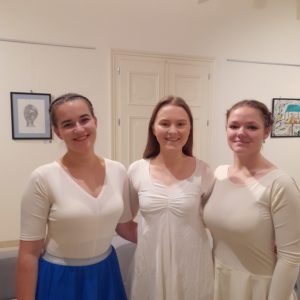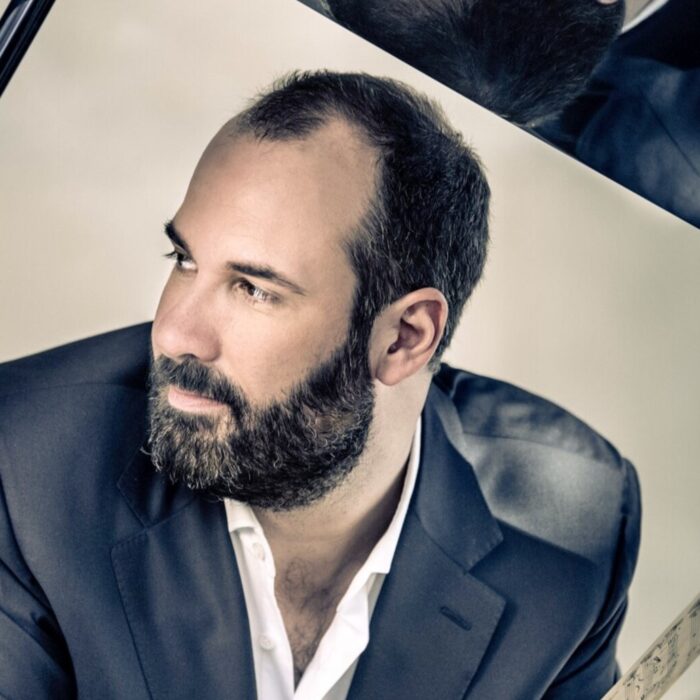
In Less Than Five Minutes, Get To Know – ‘The Three Olgas’
By Alan NeilsonOne of the delights from this year’s Janáček Festival was the Brno Conservatory’s production of a work entitled “The Weeping Fountain.” It was a short opera, lasting approximately one hour, which explored the relationship between the composer and his daughter Olga Janáčeková, focusing on the letters she sent to him whilst spending time away from home in St Petersburg. The music consists of a selection of pieces by Janáček drawn together to support the emotional ebbs and flows of their relationship and sung by soloists and a chorus from the conservatory. The work is, of course, dominated by Olga and her father, although he never actually appears in the opera.
There were three performances, each with a different singer in the role of Olga: Helena Škárová, EditaKošnárová and Ivana Solmošiová.
All have performed in student works in the past, as well as at past festivals, but the role of Olga is the biggest challenge they have all faced so far.
BACKGROUND
OperaWire: How old are you?
Edita Košnárová: 19 years old.
Ivana Solmošiová: 23 years old.
Helena Škárová: 20 years old.
OW: What is your nationality?
IS: Slovakian.
EK: Czech.
HS: Czech.
OW: What was the first opera you ever attended?
IS: When I was 12 or 13 years old, I saw “Carmen” at the National Theatre in Bratislava.
EK: The first one I can actually remember the name of was “Die Zauberflöte” in Olomouc. I was about 12 years old.
HS: “The Kiss” by Smetana at the Janáček Theatre here in Brno. I was six years old.
OW: Who has been the biggest influence on your career so far?
IS: It was my singing teacher in music school in Slovakia. She encouraged me to take the path of a singer.
EK: My current teacher.
HS: My grandmother. She used to sing with me when I was a young child.
OW: Who is your favorite composer?
IS: Verdi.
EK: Although he did not write any operas, it is Chopin.
HS: Dvorak and Tchaikovsky.
OW: What is your favorite opera?
IS: “La Boheme.”
EK: “Carmen.”
HS: “The Kiss.”
OW: What do you like about your voice?
IS: Its dark coloring. It has a velvet quality. It doesn’t pierce your ears.
EK: I also like its coloring.
HS: Also the color.
OW: If you could exchange your life with any character from an opera, who would it be?
IS: Musetta from “La Bohème”
EK: Carmen
HS: Marenka from “The Bartered Bride”
THE PERFORMANCE
OW: What did you enjoy most about playing Olga?
IS: I enjoyed the character’s complexities. I had to play Olga as a little girl and then as a young lady who has a difficult relationship with her father.
EK: My onstage boyfriend is also my real boyfriend. It was much easier performing alongside him. He was a great support, and that made it really enjoyable.
HS: It was an enjoyable way of learning about Janáček and his family. I learned a lot about them.
OW: What did you learn from the experience of performing a large role in front of a big audience?
IS: I realized just how much opera relies on a team working together. There are so many people involved, all of whom are providing necessary support. I was just one part of a big team.
EK: The experience was difficult, but I learned so much about combining speaking, singing and acting.
HS: You have to know what you are capable of and learn how to pace yourself during the performance.
OW: What was the most difficult thing about performing the role of Olga?
IS: For me, it was the combination of managing the movement and the singing. Neither is easy, but together they are very demanding.
EK: The hardest thing for me was to remember the letters and the order in which they follow one another. Also remembering how to deal with the props correctly, such as not forgetting to carry on the suitcase or how to remove the wig correctly while on stage.
HS: The constant movement while singing and speaking was difficult to manage at times
OW: What did you find most stressful about the experience?
IS: I suppose it was trying to remember all the letters; there were lots of them, along with many other things. I was worried, just in case.
EK: The thought that I would disappoint my fellow performers and ruin everything for all of us.
HS: Learning all of Olga’s letters from memory.
OW: Were you happy with your performance?
IS: There were difficulties in rehearsals, but my premiere went really well. So I was very happy.
EK: You can always do better, but I was very happy with my performance.
HS: I think I did my best, and it went well, so yes, I was satisfied with my performance.
THE FUTURE
OW: Which role that has attracted your attention would you like to sing?
IS: Octavian from “Der Rosenkavalier.”
EK: Carmen.
HS: Violetta from “La Traviata.”
OW: In which theatre would you love to sing?
IS: Nowhere in particular. I would just like to have a successful career and sing in as many countries as possible.
EK: My dream would be to sing at La Scala.
HS: I would love to sing here, at the Janáček Theatre, Brno.
OW: What do you think you might dislike about being an opera singer?
IS: The petty competitiveness that can arise.
EK: The stress of rehearsals and learning everything.
HS: The petty jealousies.
OW: What do you think you are going to like about being an opera singer?
On this, all three were agreed: being on stage.



